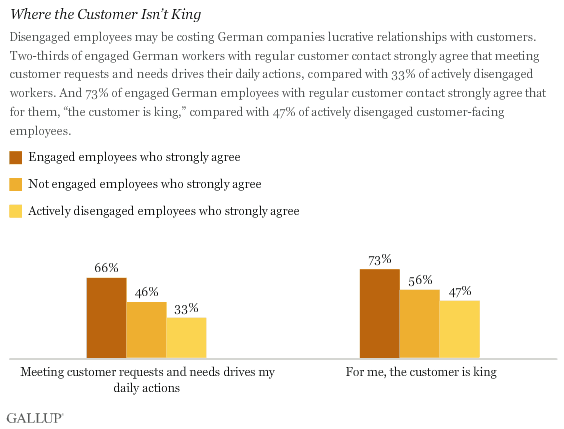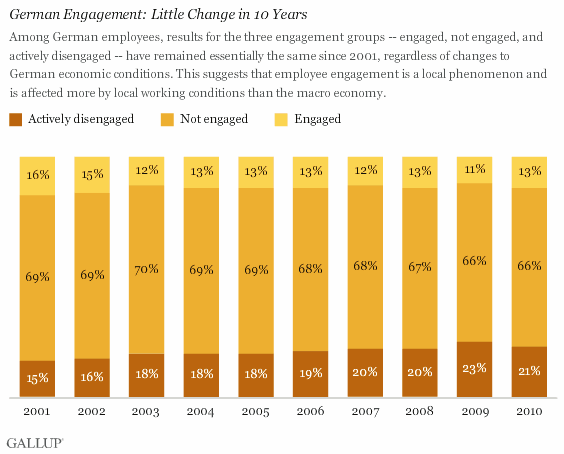Germany, the most populous state and largest economy in the European Union (EU), saw its status improve during 2010. Its 3.6% growth in GDP was the country's best in two decades and surpassed that of the United States. Germany's economic improvement last year was hardly an anomaly: As a February 2011 issue of The Economist indicated, adjusting for growth in GDP per person (or average income per person), Germany has made the fastest improvement among the G7 countries (Germany, Canada, France, Italy, Japan, the United Kingdom, and the United States) in the past 10 years.
Just 13% of Germany's employees are engaged in their jobs.
But various regional and global factors have caused economic confidence in Germany to fall in recent months. The same Economist article points to the effect net exports have made on the country's total GDP growth in the past decade, a pace the publication calls "not a sustainable engine of growth." Added to those factors are worries about the negative impact that the growing euro-zone debt crisis, the flagging U.S. economy, and the recent cooling of China's economy may have on Germany. All these problems have clouded the successes of the bright recent past.
High among the potential problems facing Germany is lack of engagement in its workforce. Recent Gallup data find that just 13% of Germany's employees are engaged in their jobs. Meanwhile, two-thirds of the country's workers are not engaged, and one-fifth of the working population is actively disengaged. Alongside traditional measures of economic strength and conventional projections of future growth, the ratio of engaged to actively disengaged employees provides Germany with a challenge and an opportunity: to improve the country's economic fortunes by maximizing the engagement of its employees.
Active disengagement is costly
Gallup estimates that actively disengaged employees cost the German economy between 121.8 billion and 133.6 billion euros per year in lost productivity. The absenteeism rate among actively disengaged German employees is 28% greater than among engaged workers. The accumulated impact of this absenteeism can be overwhelming, considering that each day an employee is away from work in Germany costs companies an average of € 247.20 per worker.
Lost productivity is only one consequence of disengagement. Failing to engage employees also may cost companies lucrative relationships with customers. Among respondents with regular customer contact (defined as "several times per week"), 66% of engaged German employees strongly agree that meeting customer requests and needs drives their daily actions. In contrast, just 33% of actively disengaged German workers strongly agree. Similarly, 73% of engaged German employees with regular customer contact strongly agree that for them, "the customer is king," compared with just 47% of actively disengaged customer-facing employees. The differences in how engaged and actively disengaged German workers consider their customers reinforce the economic risks associated with active disengagement.

Innovation and sharing ideas
In addition to missing work and neglecting to focus on the customer, actively disengaged German workers fail to share their ideas with their supervisors. Engaged workers, on average, contributed 42% more ideas to their supervisors in the last six months than did actively disengaged workers. What's more, about one in three actively disengaged employees (31%) say they did not bring any ideas to their supervisors in the past six months. Generating ideas is crucial to innovation and to the success of German organizations in fields such as mechanical and plant engineering, the automotive industry, and pharmaceuticals. And frontline employees are often the first to spot ways that organizations can streamline workflow and processes.
Why won't actively disengaged German employees offer suggestions and ideas? Perhaps because they feel no one will listen to them if they do. Fewer than 1 in 10 actively disengaged workers (8%) strongly agree that their supervisors are open to new ideas and suggestions compared with 73% of engaged workers.
Effective management is essential
The reluctance to share ideas is just one example of the chasm evident between actively disengaged German employees and their managers. For instance, only 2% of actively disengaged German workers strongly agree that their supervisor, or someone at work, seems to care about them as a person. In sharp contrast, 85% of engaged German workers strongly agree with this statement. Just 2% of actively disengaged employees strongly agree that there is someone at work who encourages their development compared with 69% of engaged employees. And only 2% of actively disengaged workers strongly agree that in the last six months, someone at work has talked to them about their progress, compared to 64% of engaged workers.
45% of actively disengaged German employees say they would fire their supervisor right now.
It is not surprising, then, that 45% of actively disengaged German employees say they would fire their current supervisor right now if they could. And a similar percentage of actively disengaged German workers (46%) say that in the past 12 months, they have thought about leaving their company due to their direct supervisor. Just 3% of engaged German employees say they would fire their manager if they could, however, while only 3% have thought about leaving their job in the past 12 months because of their boss.
Local solutions?
No organization has a single management or leadership culture. Instead, organizations have as many cultures and styles as they have workgroup managers. Culture is manifest at the local level, where people work together every day. Organizations that seek to improve their workplace -- and reap the benefit of those improvements in the marketplace -- must measure engagement regularly and report results at the workgroup level. They must also make employees at all levels accountable for taking action to drive those changes.
But most German companies don't use this type of measurement and management; 4 in 10 German businesses do not conduct employee surveys, according to a study of German companies with more than 500 employees conducted by the Wiesbaden Business School and 2hm & Associates GmbH. In organizations that do survey their employees, 64% of respondents say they survey employees every two years or less frequently, while 28% say they conduct surveys annually. The survey results are reviewed by human resources (90%) or the board or top management (83%), yet only 23% of respondents say the surveys ask questions related to leadership behavior -- and only 22% say managers of the company actually use the feedback from the surveys.
The result is a top-down approach with little local accountability at the workgroup level. So it's not surprising that only 26% of respondents indicated that employee survey results had a strong or very strong effect in improving the organization's performance.

There are many economic forces outside an organization's control, as executives have learned from the ongoing global economic crisis. Yet German organizations have the capacity within their own organizations to improve their productivity and profitability by harnessing the power of engaged employees. Organizations that can tap this resource can gain and sustain a competitive advantage in the global marketplace.
Survey Methodology
Results of this survey are based on a nationally representative sample of 1,920 employed adults aged 18 and older in Germany. Interviewing was conducted by telephone from October 25 to November 18, 2010. For results based on samples of this size, one can say with 95% confidence that the error attributable to sampling and other random effects would be ±2.2 percentage points. For findings based on subgroups, the sampling error would be higher. Gallup has conducted the Engagement Index for Germany each year since 2001.